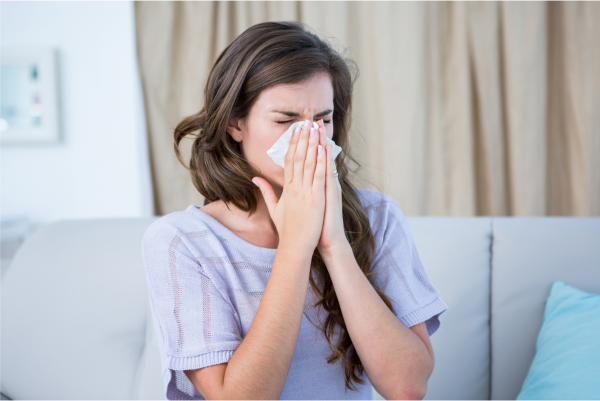Losing your sense of smell, also known as anosmia, can be a distressing experience, especially since it is now often associated with COVID-19. However, it’s important to know that there are many possible causes of anosmia, and not all of them are related to the coronavirus. Otolaryngologists, or ENT doctors, specialize in diagnosing and treating disorders related to the ear, nose, and throat, including anosmia.
This post explores the potential causes of losing your sense of smell and provides helpful tips on what to do if you experience this condition. After reading, you’ll be better equipped to understand and manage anosmia, whether it’s related to COVID-19 or not.
What Causes the Loss of Smell?
Many people believe that a respiratory virus is always to blame for the loss of smell, but that is not always the case, as other factors may actually be responsible. Some of the most prevalent causes of anosmia include:
- Sinus Infections: The sinuses are the air-filled spaces behind your forehead, cheekbones, and eyes. When you have a sinus infection, the inflammation and swelling can block the nasal passages and affect your sense of smell.
- Allergies: Allergies can cause inflammation and swelling in the nasal passages, leading to a loss of smell.
- Nasal Polyps: Nasal polyps are growths that can develop on the lining of the sinuses or nasal passages. They can block the nasal passages, leading to anosmia.
- Head Trauma: A head injury that damages the olfactory nerve, which is responsible for transmitting signals from the nose to the brain, can cause a loss of smell.
- Aging: As we age, our sense of smell can decline due to a reduction in the number of olfactory neurons.
- Medications: Certain medications, such as antibiotics, blood pressure medications, and antidepressants, can cause a loss of smell.
- Neurological Disorders: Some neurological disorders, such as Parkinson’s disease and Alzheimer’s disease, can affect the sense of smell.
COVID-19 and Loss of Smell
COVID-19 can cause a range of symptoms, including fever, cough, fatigue, and loss of taste or smell. The loss of smell due to COVID-19 is usually sudden and profound, and it can occur even in the absence of other symptoms.
The loss of smell due to COVID-19 is believed to occur due to the virus’s ability to infect the cells that support the olfactory neurons. These cells are located in the upper part of the nasal cavity, where the virus enters the body.
If you have recently lost your sense of smell, it is essential to determine whether it is due to COVID-19 or some other cause. A COVID-19 test is the most reliable way to confirm if you have the virus. If your COVID-19 test comes back negative, it is still possible that you have another viral infection or a non-infectious cause of anosmia.
What to Do If You Have Lost Your Sense of Smell
If you have lost your sense of smell, it is wise to consult an ENT doctor. Your ENT doctor will perform a physical examination, take a detailed medical history, and may order tests to determine the underlying cause of your anosmia.
If your anosmia is due to a sinus infection or allergies, your ENT doctor may prescribe medication to reduce inflammation and swelling in the nasal passages. In some cases, nasal saline rinses or nasal steroid sprays may also be recommended.
If you have nasal polyps, your ENT doctor may recommend surgery to remove them. In some cases, medications can help shrink the polyps and improve the sense of smell.
If your anosmia is due to a head injury, your ENT doctor may refer you to a neurologist for further evaluation. Other treatments, or even surgery, may be necessary.
If your anosmia is due to aging, there is no specific treatment available. However, your ENT doctor may recommend some lifestyle changes, such as quitting smoking and avoiding exposure to environmental toxins that can damage the sense of smell.
If your anosmia is due to medications, your ENT doctor may recommend changing or discontinuing the medication.
If your anosmia is due to COVID-19, there is no specific treatment available, but the sense of smell usually returns within a few weeks to a few months. Your ENT doctor may recommend some home remedies, such as nasal saline rinses, to help improve your sense of smell and taste.
Preventing the Loss of Smell
There are several things you can do to prevent the loss of smell:
- Practice good hygiene: Wash your hands regularly and avoid touching your face, especially your nose and mouth.
- Wear a mask: Wearing a mask can help prevent the spread of respiratory viruses, including COVID-19, which can cause a loss of smell.
- Avoid smoking: Smoking can damage the sense of smell and increase the risk of respiratory infections.
- Manage allergies: If you have allergies, follow your treatment plan to prevent inflammation and swelling in the nasal passages.
- Protect your head: Wear a helmet when participating in high-risk activities, such as biking or skiing, to prevent head injuries.
- Maintain a healthy lifestyle: Eating a balanced diet, getting regular exercise, and getting enough sleep can help support your immune system and overall health, which can reduce the risk of respiratory infections and other conditions that can affect your sense of smell.
- Reduce exposure to pollutants: Exposure to air pollution, chemicals, and other environmental toxins can damage the olfactory nerve and decrease your sense of smell. Try to reduce your exposure to these pollutants by avoiding smoking, using air filters, and avoiding areas with heavy pollution.
- Avoid nasal irritants: Certain chemicals and irritants, such as cleaning products, perfumes, and hair sprays, can irritate the nasal passages and cause a loss of smell. Try to avoid exposure to these irritants as much as possible.
- Get regular check-ups: Regular visits to your healthcare provider can help identify and treat conditions that can affect your sense of smell, such as sinus infections or nasal polyps. Be sure to discuss any changes in your sense of smell with your doctor.
Key Takeaways
Losing your sense of smell can be a distressing experience, but it is not always a result of COVID-19. In fact, various factors can cause a loss of smell. If you have recently lost your sense of smell, it is advisable to consult an ENT doctor to determine the underlying cause and receive appropriate treatment. By practicing good habits and seeking medical advice when necessary, you can help prevent the loss of smell and other respiratory infections.

